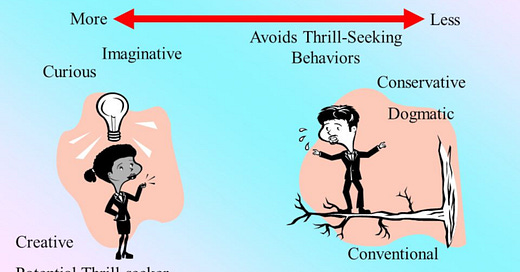Any given person is going to be a wonderfully messy combination of liberal and conservative traits. Or at least, they will apply conservative and liberal policies differently depending on the context. As Nassim Taleb has said:
“I am, at the Fed level, libertarian;
at the state level, Republican;
at the local level, Democrat;
at the family and friends level, a socialist
—with my dog, I am a Marxist.
Everyone knows we’re becoming more politically polarized. But there is one aspect of our polarization that almost no one is talking about. And that’s the grossness gap—the divide between liberals and conservatives in their experience of disgust.
It might not surprise you to learn that liberals are less easily disgusted than conservatives. With the notable exception of their reaction to Trump, liberals can stomach a lot more than conservatives. For example, when asked how disgusting it is to eat monkey meat or taste a piece of chocolate in the shape of dog poop, liberals are, as they say, more “open to it” than their conservative bretheren.
The reasons for the disgust divide are the subject of this post.
Why are liberals not easily disgusted?
A significant reason liberals are not put off by things conservatives find disgusting is that they have a personality trait called “openness to experience.” Jonathan Haidt has published research showing that liberals like things that are novel, exotic, or ground-breaking. It’s not for nothing that liberals are called progressive. Likewise, they enjoy art, music, and literature to a greater extent than conservatives, often getting goosebumps from, say, a musical performance. They are curious about the world and its people. They love learning. These inclinations at the level of temperament. They’re baked into a person.
In the same way that mothers embrace and love their children despite the children’s messiness and germs, liberals’ zest for novel experiences overrides any sense of nausea and disgust.
It’s about the morals
Liberals are also less susceptible to disgust because of their moral orientation. Researchers have identified six major moral concerns that all people base their ethical decisions on.
Care/Harm
Concern for the suffering of others; compassion.
"It’s wrong to hurt people."
Fairness/Cheating
Justice, equality, reciprocity, and proportionality.
"People should get what they deserve."
Loyalty/Betrayal
Group allegiance, patriotism, self-sacrifice for the group.
"Don’t betray your tribe or country."
Authority/Subversion
Respect for tradition, legitimate authority, and hierarchy.
"Respect those in charge."
Sanctity/Degradation
Disgust, purity, and moral cleanliness—often tied to religion or the body.
"Keep sacred things sacred."
Liberty/Oppression (added later)
Desire for freedom; resistance to domination or control.
"Don’t tread on me."
When making moral choices, liberals tend to focus on Care/Harm. Rounding out their top three are Fairness (equality) and Liberty (from oppression). This triune orientation [Care, Fairness, and Liberty] causes them to feel tenderly toward the downtrodden regardless of the oppressed’s behavior, hygiene, or other offensive characteristics. The desire to be compassionate, to uphold equality, and to free others from oppression overrides their disgust. The sentiments of the song L’Internationale sum up their worldview. Listening to the song, it is not hard to see how the feeling of brotherhood could cause a person to rise above petty feelings of disgust.
Preserve, protect, and pee-eew, that’s gross
Conservatives, on the other hand, are more well-rounded in terms of their moral underpinnings, tending to draw from all six foundations. However, they do show some preference for Loyalty, Authority, and Sanctity. Conservatives’ special cocktail of moral preferences makes them less sympathetic to substance abuse and the boundary-violating behavior associated with addiction.
Loyalty/Betrayal: It bothers conservatives when people choose drugs and alcohol over their obligations to family and society.
Authority/Subversion: Law, order, and tradition are important to conservatives. They don’t like it when people endanger safety or impact the quality of life by breaking the law. Instead, they want to see others strive to be upright citizens who keep the streets clean and safe."
Sanctity/Degradation: Conservatives want to keep things pure. That means they don’t want to see people put filth in their bodies or pollute their communities with substances, crime, or vagrancy.
Thus, conservatives are less likely to pity addicts and more likely to want to see them punished for their actions. Likewise, they are more likely to see reminders of our animal essence in the behaviors of addicts. Thus, they are more likely to experience disgust.
All in the family
As quick, and mildly offensive shorthand, we can use Edith and Archie Bunker as stand-ins for liberals and conservatives.




